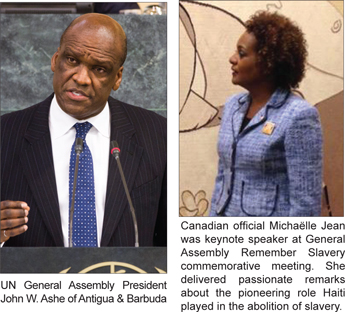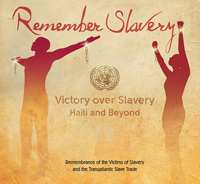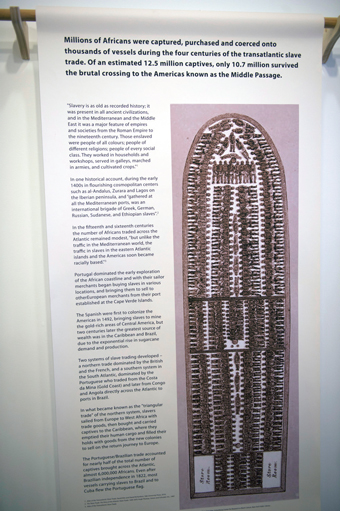By Saeed Shabazz -Staff Writer-

UNITED NATIONS (FinalCall.com) – The 193-member UN General Assembly recently held a delegate-level commemoration honoring the victims of the Trans-Atlantic Slave Trade. The March ceremony has been an annual event since 2007 and remembers the more than 15 million men, women and children who suffered and died during the more than 400-year slave trade, the largest forced migration in history, according to the United Nations.
But while the ceremony was respectful it did not focus on reparations as a remedy for suffering and death during slavery.
During his address to the gathering, UN General Assembly President John W. Ashe of Antigua & Barbuda noted that the international community admits slavery and the slave trade were crimes against humanity, the same determination reached at 2001 World Conference against Racism, Racial Discrimination, Xenophobia and Related Intolerance, held in Durban, South Africa.

Joao Soares Da Gama of Guinea-Bissau, representing the African Group and linking himself with the 115-nation Non-Aligned Movement, told the gathering there was support from both groups “to mobilize political will at the national, regional and international levels and to reaffirm the political commitment to full and effective implementation of the Durban Declaration and Program of Action.”
Cuban delegate Daylenis Moreno Guerra said her nation understands the “consequences” of the slave trade, notably in the colonial plantations that slavery produced. “Yet,” she said, “Cuban traditions had emerged from African predecessors, who had brought with them wisdom and the spirit of rebellion against injustice.”
Cuba supports the payment of reparations for the genocide and crimes against humanity committed during the Trans-Atlantic Slave Trade, she added.
The Cuban delegate was the only speaker to address the issue of reparations, which was the most controversial part of the outcome document from the World Conference Against Racism, and an issue on which the General Assembly has been largely inactive.

“People have forgotten Durban 2001 because of the way the U.S. boycotted the WCAR, not only then, but during the 10-year review process,” Dowoti Desir, founder of the New York-based DDPA Watch Group told The Final Call.
The Durban Declaration and Program of Action, or DPAA, stated nations would commit to ending racism, racial discrimination, xenophobia and related intolerance and would develop programs for poverty alleviation, inadequate education, and access to health care.
“However, the priority of the DDPA was restitution in the form of reparations for the Afro descendent community based on the conclusion of the WCAR that the Trans-Atlantic Slave Trade is a crime against humanity,” Ms. Desir noted.
“We have learned that many member states have undertaken initiatives at the national level to ensure full and equal enjoyment of human rights and fundamental freedoms by people of African descent in all spheres,” noted Ambassador Ashe, during his March 25 address to the member states.
“Not good enough,” responded Dr. Conrad Worrill, writer, activist and director of the Carruthers Center for Inner City Studies in Chicago. He was a member of the “Durban 400,” the name given to the Black delegation that attended the 2001 World Conference Against Racism. “The election of a Black president, and the super-patriotism generated from 9-11 tabled the discussion on reparations in America,” he told The Final Call.

Dr. Worrill and other members of the Durban 400 find themselves at odds with the UN General Assembly, in that the body composed of UN member states has not adopted officially the DDPA. The Final Call for the past two years has sent e-mails to the office of the spokesperson for the UN General Assembly president and the UN secretary-general’s office asking when the DDPA would be adopted to no avail–and stark silence.
Procedurally, if the resolution to accept the DDPA were brought to the floor it would take 50 percent plus one to pass. If the General Assembly determines that the issue is an “important question” then a two-thirds majority is required. However, not one UN official, including the Office of the High Commissioner in Geneva would speak on bringing the DDPA before the UN General Assembly.
Activists are not waiting for the United Nations, and on April 19 in Chicago a major conference on reparations is planned, said Dr. Worrill. The conference will feature the Honorable Minister Louis Farrakhan of the Nation of Islam; Prime Minister of St. Vincent & the Grenadines Ralph Gonsalves and Ron Daniels, founder of the Institute of the Black World 21st Century.
Dr. Gonsalves is one of the main forces behind the 14-member Caribbean Community’s 10-point plan that seeks a formal apology and debt cancellation from former colonial nations Britain, France and the Netherlands. The Caribbean leaders have asked a British law firm to develop a lawsuit for reparation payments.
The Final Call received a notice from the Committee to Collect saying that beginning March 28, and the fourth Friday of every month “until restitution for Blacks is a topic of discussion on Capitol Hill; and a bill is signed into law–petitions will be presented to elected officials.” The campaign is sponsored by Committee to Collect, N’COBRA (National Coalition of Blacks for Reparations in America), We the People U.S. Citizens and the Juneteenth Movement.
“The fight for reparations will never go away,” insisted Dr. Worrill. “We are owed!”
(For more information e-mail [email protected].)












